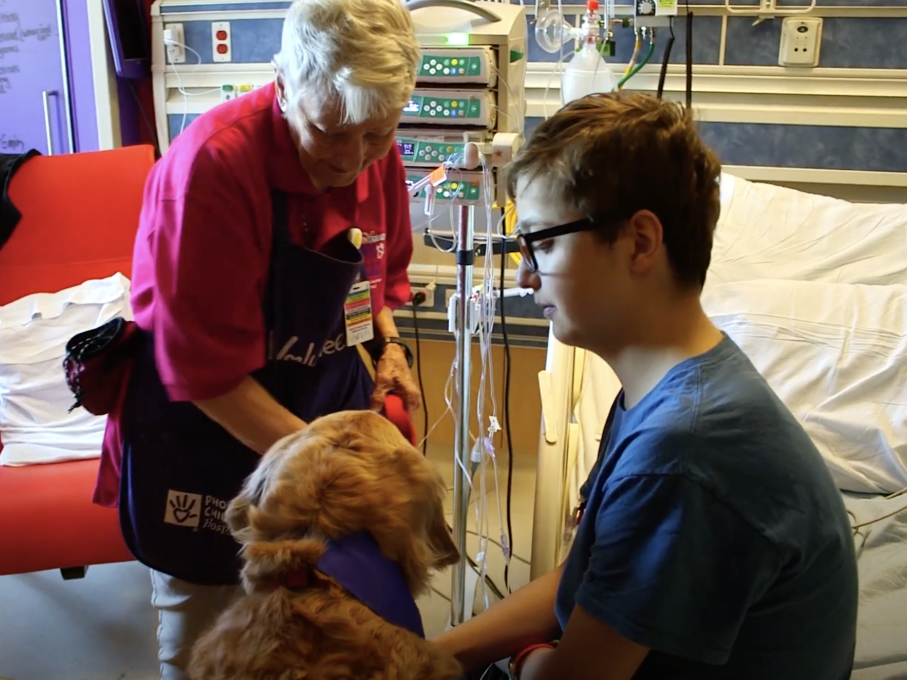A child with heart failure has a diseased heart that can’t pump enough blood to meet the body’s demands. Symptoms may include fatigue, excessive sweating or trouble breathing.
Pediatric heart failure is a condition that can have varied causes, including congenital heart defects and acquired or inherited heart disease. Doctors may refer to it as advanced or end-stage heart disease.
Heart failure is a serious condition, but children have many good treatment options available through the Center for Heart Care. It is the only program of its kind in the region, led by fellowship-trained, multispecialty pediatric cardiologists with high-level skills and a passion for helping children and families.
Our cardiologists use the latest advances to manage heart failure, delay its progress and renew a child’s strength, health and quality of life. We treat children at every stage of life from fetal care through teens transitioning to our Adult Congenital Heart Disease program.
Hearts and Hope for Kids
The Center for Heart Care at Phoenix Children’s stays in the forefront of quality, research and innovation to offer exceptional heart care for kids.
Your child’s heart specialistswill discuss treatment options for heart failure, including its causes or related disease, such as congenital heart defects, cardiomyopathy (heart muscle disease), arrhythmia (abnormal heart rhythm) and other conditions.
In addition to diagnostic testing and consultation, we offer:
- Interventional cardiology using novel imaging technologies for less invasive surgical procedures
- Heart surgery, including minimally invasive, open surgery and hybrid (combined) surgical approaches
- Mechanical circulatory support (MCS) including surgically implanted medical devices, such as ventricular-assist devices (VADs) and total artificial hearts, which can be used to pump blood around the body when the child’s own heart is too weak to do the job
- Heart transplant which requires multispecialty screening and consultation, organ procurement, critical care, cardiac rehabilitation and life-long follow-up care
- Comprehensive programs, services and support
Meet Jayken: a Transplant Success Story
The heart transplant leaders at Phoenix Children’s have been performing successful transplants for patients like Jayken since 2011.

Research Advances
Our team includes academic leaders involved in novel research to enhance care. For example, the Phoenix Children’s Center for Heart Care partnered with Arizona State University to improve the development of complex customized heart models.
Custom models help doctors to study disease, inform families and guide presurgical planning, such as the best use of MCS to support heart function. Our work has led to innovations like these:
- 4D Cardiology Visualization and Analytics (CAVA) Lab
- Cardiac volumetrics – Using advanced imaging technology, doctors can measure heart volume and size, enabling them to find closely matched donor organs for recipients. This helps to expand the pool of potential donors and shorten wait times.
Helping Gabriel – the World’s Youngest Artificial Heart Patient
Children like Gabriel are why we’re devoted to high-level heart care. The 10-year-old boy was fighting end-stage heart failure when he became the world’s youngest recipient of a lifesaving total artificial heart (TAH).
Health officials approved the smaller 50cc model for children as an alternative to the larger 70cc TAH typically used for adults. Now, certain children with severe heart failure can receive a TAH as a long-term option or a bridge to transplant surgery.
Finding the Right Heart
Transplant surgeons at Phoenix Children’s closely evaluate compatibility – including blood type, body and heart size, and condition – as well as distance, wait lists and other details.
Our team leads the way in applying new technologies, such as volumetrics. New approaches help doctors to match donor hearts using heart volume and size measurements rather than conventional body-weight comparison approaches for matching available hearts to potential recipients. Advanced imaging and other capabilities allow our doctors to expand the donor pool for children waiting for a heart transplant. This can lead to shorter waiting times and faster recovery.
We also help children who face challenges due to antibodies developed after blood transfusions or surgery, which can increase the risk of organ rejection. Our doctors have improved care for kids like these by developing virtual crossmatching techniques to identify good matches and lower rejection risk.
Frequently Asked Questions
The organ transplant process can seem overwhelming at times. Your transplant coordinator will offer support, answer questions and guide you through every step. The following common questions offer a general overview of what to expect.
Donor organs come from deceased heart donors who participated in an organ donation program. In some instances, a family member donates a spouse’s or child’s organs after a fatal illness or accident.
Once a child is approved for a transplant, the child’s name is shared with the United Network for Organ Sharing (UNOS) database. UNOS oversees organ donation and distribution, prioritizing recipients based on several criteria. These include compatibility measures, such as blood type, body and heart size, your child’s location, severity of illness and other considerations.
Wait times can range from days to years. Although specialists prioritize organ donors from close locations, children can receive a donated heart from anywhere within the United States. Heart transplant doctors at Phoenix Children’s examine the organ to ensure it’s healthy and compatible.
Your child’s transplant coordinator will tell you how to be ready whenever an organ becomes available. Your transplant coordinator will contact you, so it is essential to provide current contact information and alternate contacts. Also, keep fully charged devices with you.
You will need to have a packed suitcase ready and bring your child’s medications. Your care team will tell you which drugs your child should take or delay before surgery, and where to go when you arrive at Phoenix Children’s Center for Heart Care.
Families should make caregiver arrangements in advance and have reliable transportation options. When you arrive at Phoenix Children’s Center for Heart Care, the transplant coordinator and team will direct your family and prepare your child for surgery. Your child will have blood tests and other testing before the transplant.
After your child receives a general anesthetic, doctors put your child on a heart-lung machine to circulate blood throughout the body. Surgeons open the chest to remove the diseased heart and implant a new heart, attaching major blood vessels. Doctors remove the machine once the new heart is in place and is beating on its own.
Transplant surgery can take four hours or longer, depending on the child’s condition. Our team will visit you in a nearby waiting room to keep you informed throughout the surgery.
Your child will awaken gradually and may feel groggy as the anesthesia wears off. A breathing tube attached to a ventilator provides respiratory support for a day or two after surgery so your child will not be able to talk, but will have medicine to help with rest. Doctors will discuss your child’s condition and the post-surgery healing process.
Specialists in our cardiovascular critical care unit (CVICU) manage post-transplant care, including advanced, 24/7 monitoring. They treat surgical wounds and manage IV pain medication, ventilator care, feeding and fluid-drainage tubes, and medication, including antibiotics and anti-rejection drugs.
After further recovery, doctors determine whether patients are ready to move to another hospital room at Phoenix Children’s Center for Heart Care. Most patients go home within one to three weeks.
Your care team will go over your child’s discharge plans, including instructions about home care, follow-up appointments, wound care and how to recognize and report potential complications or get help for questions or concerns.
Recovery includes specialized cardiac rehabilitation, including respiratory, physical and occupational therapies to help your child exercise, heal and build strength.
Doctors reduce and adjust medications as your child recovers, but your child will require anti-rejection medication and regular heart monitoring and checkups throughout life. Although it’s a challenging process, with expert care and healthy lifestyle habits, most children enjoy renewed vigor and a good quality of life after a heart transplant.
Locations

